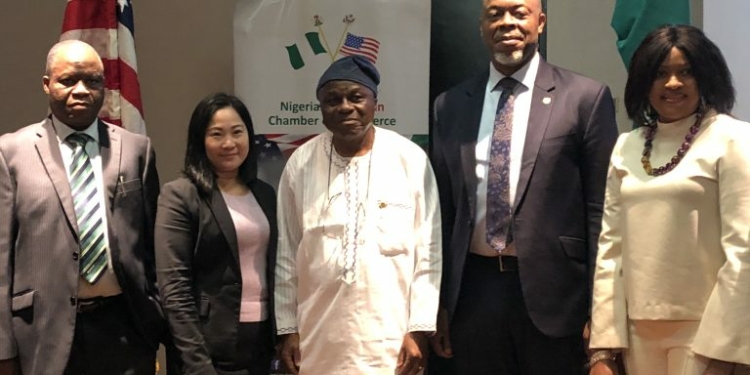The African Export-Import Bank (Afreximbank), and other stakeholders have called on the federal government to deploy mechanisms to leverage the Africa Continental Free Trade Area (AfCFTA) to improve the country’s trade performance.
This was made known on Tuesday by stakeholders at a breakfast meeting organised by the Nigerian-American Chamber of Commerce (NACC) in Lagos.
The meeting, themed ‘One Year of AfCFTA: Opportunities, Challenges and the Nigerian-American Partnership’, had trade experts in attendance who emphasised the need to harness the benefits of the AfCFTA.
Speaking at the meeting, Mike Ogbalu, chief executive officer, Pan-African Payment and Settlement System (PAPSS), said there was a need for Nigeria to utilise the efficient payment system to facilitate Intra-African trade.
He said the PAPSS, being a product of AFREXIM bank, was a supporting platform that facilitates instant cross-border payments in local African currencies.
He added that the platform would save African traders about $5 billion annually in currency convertibility if fully utilised.
“Intra-African trade is about 15 to 18 percent which is by far the lowest intra-continental trade globally. High cost, high dependence on foreign exchange, and inefficient payment systems contribute to these poor statistics,” he said.
“Cross-border transactions are very expensive leading to an estimated $5 billion in payment charges annually.
“Most cross-border payment transactions originating from African banks are cleared outside the continent with less than 20 percent of the total payment flows being cleared in Africa.
“We need to solve these challenges to grow trade in the continent.”
On his part, John Isemede, former director-general, Nigerian Association of Chamber of Commerce and Industries, Mines and Agriculture (NACCIMA), said the federal government should be more fully prepared to participate in the AfCFTA.
He added that Nigeria, which is supposed to be at the forefront, lacked adequate structure, coordination, and communication needed to implement and take advantage of AfCFTA.
Isemede, therefore, called on the government to have regular dialogue with the organised private sector to share templates and collaborate on the right structures to enhance Nigeria’s trade performance.
In the same vein, Abubakar Bello, managing director, Nigerian Export-Import (NEXIM) Bank, said the firm, through its products and services, would continue to support exports and drive the implementation of AfCFTA.
Bello was represented by Daniella Jarikre regional head, NEXIM Bank Lagos.
He said the bank was committed to promoting export diversification through the provision of finance, risk-bearing, and advisory services in line with the government’s trade policies and best practices.
Bello expressed the willingness of the bank to partner with NACC to facilitate export expansion from the Nigerian market to the United States of America.
“NEXIM Bank was established with the mandate of driving all non-oil exports sector by stimulating business engagement and transactions in the manufacturing, agricultural, solid minerals, and services sector of the Nigerian economy,” he said.
“It was also established to support all home-grown non-oil businesses, creating employment for Nigerian citizens, strengthening trade collaborations from the national to international levels, and generating foreign exchange for the economy.“
Also speaking, Dame Adebola-Williams, national president, NACC, said Nigeria was yet to maximise opportunities of AfCFTA despite its vast non-oil exports potentials.
Adebola-Williams who was represented by Thomas Tunbosun, deputy national president, NACC, said Nigeria had largely underperformed and was yet to take advantage of various opportunities such as the African growth and opportunities act (AGOA).
“We will, therefore, continue to broker healthy interactive discussions with relevant facilitative government and private agencies that are capable of providing useful information that may help our members who are already into exports,” she said.










Discussion about this post